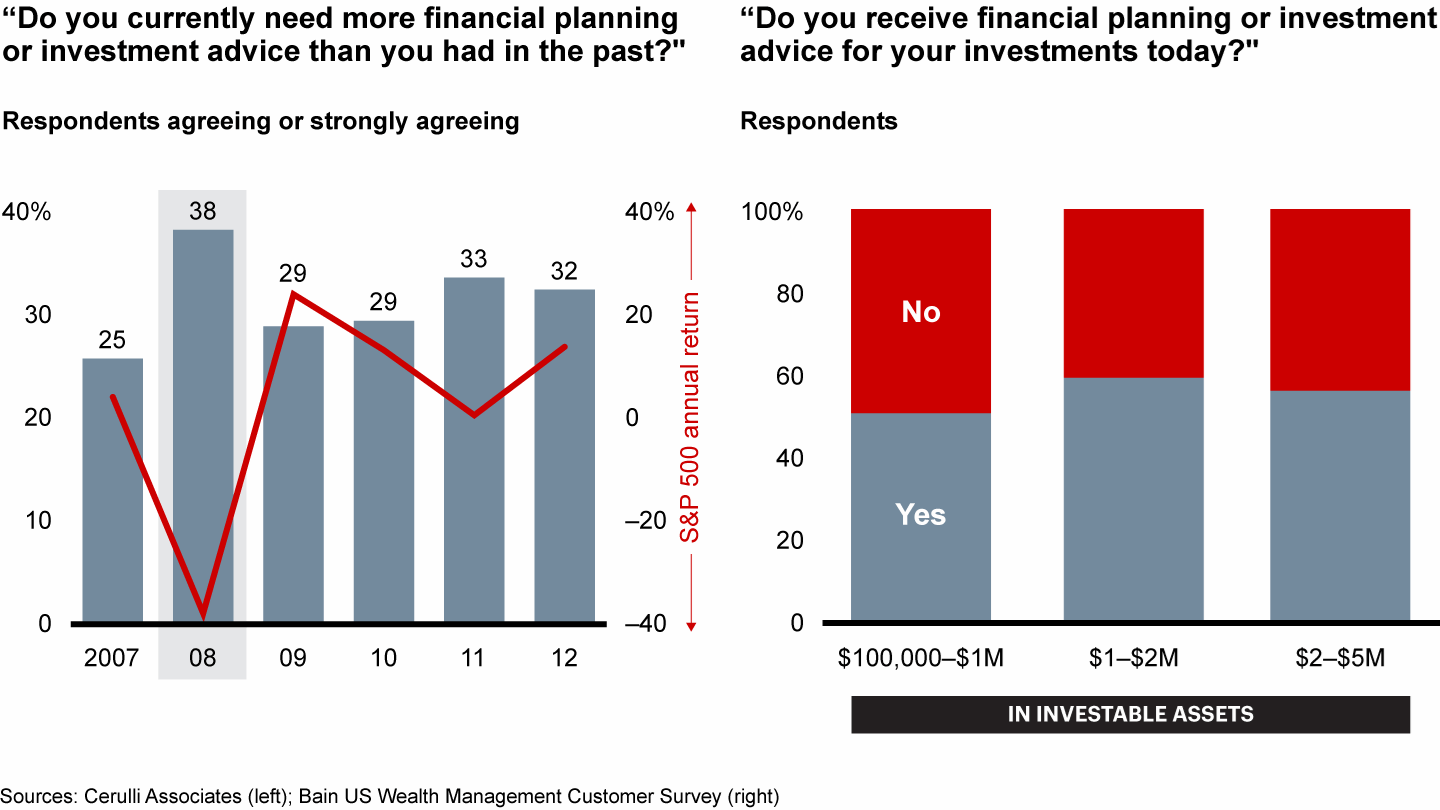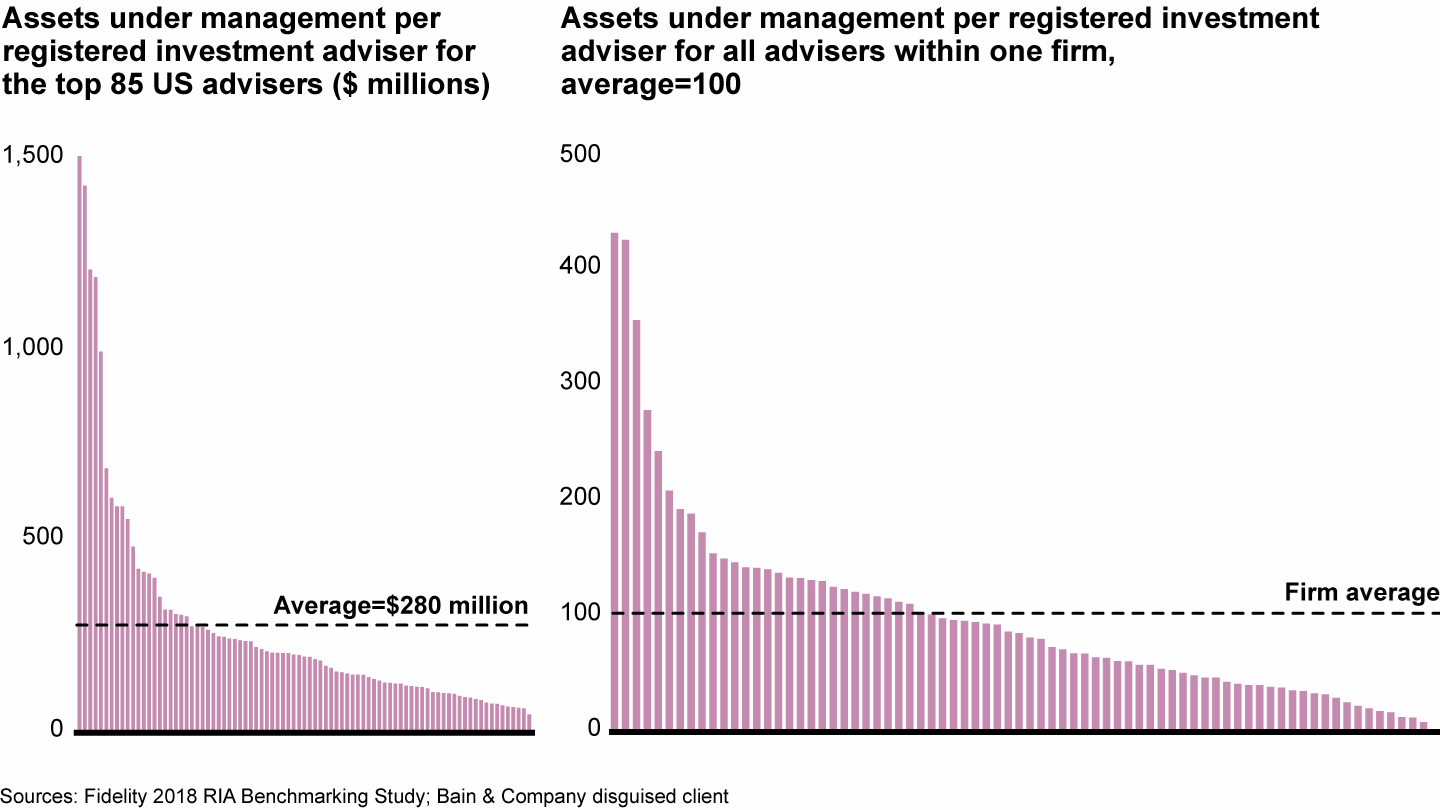Brief

Beyond the mounting toll on health taken by Covid-19, the extensive work stoppages and asset price declines have severely affected household wealth. Individuals and families whose incomes and assets just plunged are now dealing with great disruption to their retirement plans or other aspects of their financial outlook.

Macro Surveillance Platform
For more detail on the business implications of coronavirus from Bain’s Macro Trends Group, log on to the Macro Surveillance Platform. Learn more about the platform >
These stresses have rippled out to wealth management firms, with hits to their profitability and share prices.
To protect employees, support clients and shore up the underlying business, companies’ responses must be bold along two fronts. Leading wealth management firms are acting now with near-term tactics to stabilize the business. A smaller group of firms are also planning now with strategic initiatives to build stronger businesses on the far side of the crisis.
Act now to stabilize the business
Clients need sound advice during a crisis. Advisers’ first priority must be to do right by their clients. Advisers should extend themselves to engage regularly, tailoring their empathy to the particular client as they reset financial plans.
This period also presents an opportunity to reach underserved investors, as demand for advice tends to increase during periods of market turbulence. Roughly half of US investors with investable assets between $100,000 and $5 million do not have a financial adviser today, according to a recent Bain & Company survey of 1,200 investors. And half of those investors with advisers are not fully satisfied with the advice they receive (see Figure 1).
Investors crave advice during a crisis, and many do not have an adviser


Some advisers already report increases in requests from people unhappy with the performance of their current adviser and those without an adviser. A number of firms have ramped up marketing. Boulevard Family Wealth in Los Angeles is reengaging prior leads and offering free advice. Buckingham Strategic Wealth in St. Louis is hosting virtual happy hours to connect with influencers such as estate planners, CPAs and attorneys, with a rise in new client engagements as a direct result.
Along with these marketing efforts, wealth management firms are trying to contain costs. Beyond the obvious areas of in-person marketing events, travel and entertainment, firms can review discretionary staff bonuses and subscriptions for noncore IT tools.
Firms should also invest in their advisers. Retaining the most productive advisers is critical for retaining assets, and the success of A-caliber advisers can also improve the performance of other advisers. For example, daily calls with all advisers could showcase effective tactics to stay engaged with clients.
Plan now to accelerate growth after the crisis
A smaller group of wealth management firms will be able to augment near-term actions with more strategic moves designed to improve their position over the longer term. They have started to emphasize the following areas:
- Digital adoption. A transition to digital ways of working that had been taking years now is taking weeks in some cases. Those companies that accelerate digital models of client acquisition, client engagement and supporting processes such as e-learning and automated portfolio reporting will be able to permanently reduce their cost base. Accounts served under digital hybrid models often realize 30% to 40% lower costs, in our experience.
- Financial planning first. At this moment, advice should focus mainly on financial planning rather than mutual fund or equity selection. Firms that shift advice toward planning conversations also open the door to expand beyond commission-based products into a broader portfolio of wealth management and ancillary services.
- Amplify the role of the home office. While wealth management firms can take differing approaches to their “home office” model (as distinct from working at home), those that enable advisers to focus more on client development and engagement will have an advantage. That involves the provision of home office portfolios, organized lead generation and tools for activities that range from codifying the financial planning approach to automated reporting.
- Adviser productivity. A time of turmoil puts a premium on identifying and investing in the most productive advisers. Analysis of adviser productivity typically highlights a small number of highly productive advisers, with a longer tail of less productive advisers (see Figure 2). Armed with this knowledge, and a redefined home office, firms can continue to support the most productive advisers and shift accounts that are not economic for advisers to the “house.”
Adviser productivity varies widely across and within wealth management firms


Firms can also ramp up both adviser recruitment and strategic M&A to acquire high-performing advisers. For example, coming out of the last financial crisis, Ameriprise reshaped its adviser talent model to improve profitability. It scaled back its adviser training program, targeting only 50 to 100 very talented novices per year, and instead recruited 550 experienced advisers in 2009, up from precrisis levels of fewer than 100 per year.
By combining these selective near-term and longer-term moves, wealth management firms can do right by their clients and prosper in the months and years ahead.

Coronavirus
The global Covid-19 pandemic has extracted a terrible human toll and spurred sweeping changes in the world economy. Across industries, executives have begun reassessing their strategies and repositioning their companies to thrive now and in the world beyond coronavirus.
Andrew Edwards, Matthias Memminger and Antonio Rodrigues are partners with Bain & Company’s Financial Services practice. They are based, respectively, in Toronto, Frankfurt and Toronto.